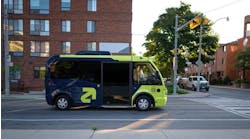Arrowhead Transit partners with Minnesota North College to expand transportation access
Arrowhead Transit is partnering with Minnesota North College to provide enhanced public transportation access to students, staff and the surrounding communities. The collaboration seeks to expand transportation options for rural Minnesotans, demonstrating that transportation models designed for urban areas can be successfully adapted for rural settings.
As part of the initiative, Arrowhead Transit will track student usage of various services, including scheduled stops, commuter routes and Dial-A-Ride. Arrowhead Transit notes these services are specifically designed to make travel to and from campus more convenient and efficient.
“Just because our communities are rural doesn’t mean the same opportunities for mobility shouldn’t exist as in urban areas,” said Arrowhead Transit Director Brandon Nurmi. “We are excited to offer a transportation solution that makes it easier for students to move freely between campuses, housing and essential services. Our goal is to create more interconnectivity between cities and colleges, providing an affordable, reliable and equitable transportation network for all.”
Key details of the collaboration include:
- Scheduled stops and Dial-A-Ride services: Arrowhead Transit will offer curb-to-curb transportation services to and from Minnesota North College campuses, ensuring easy access to class, events and essential services in the surrounding area.
- Ticket color change: A dedicated Minnesota North Transit ticket will be introduced to help track ridership and streamline the use of these services.
- Expanded routes: In addition to existing routes, commuter routes will link campuses to the larger Arrowhead Transit network, making it easier for students to travel between cities like Grand Rapids, Hibbing and Virginia.
Arrowhead Transit notes the partnership aims to support students in accessing not only education, but also housing options, shopping, entertainment and essential services, all while reducing transportation costs and promoting a more sustainable form of travel. According to the agency, in communities like Grand Rapids, Hibbing and Virginia, where housing options are often spread out, providing a reliable transit system will expand choices for students and facilitate a more integrated community.
“Transportation shouldn’t be a barrier to education or community engagement,” Nurmi said. “By expanding access to public transit, we’re helping students stay connected, both to their campuses and to everything their communities have to offer.”


